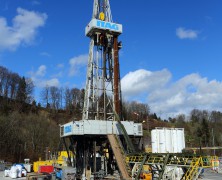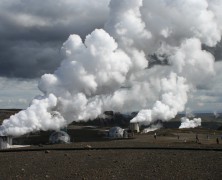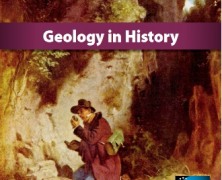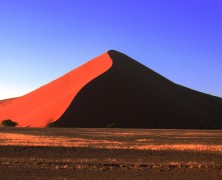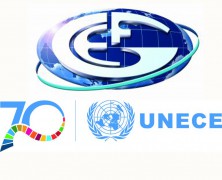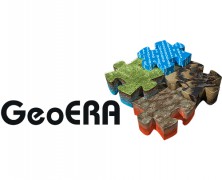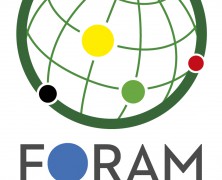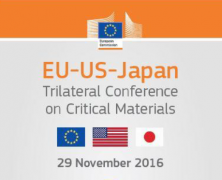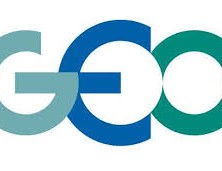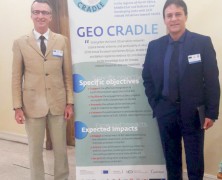PRESS RELEASE Bern, 3 March 2017 – the Federal Council (the 7-member government of Switzerland) stated its position on the use of the subsurface by hydraulic fracturing (fracking). The application of the technology should in general be possible under certain conditions, in particular when associated with drillings to extract geothermal heat from great depths. However, the Federal Council does not support the development of natural gas reserves by hydraulic fracturing due to Switzerland’s climate policy. At the same time, the Federal Council sees no reason for a moratorium. Swisstopo, Switzerland’s geological survey, will follow the acquisition and valorisation of these geological underground data. The link to this press release is (French, Italian and German):...
Good legal framework for deep geothermal energy in Switzerland
posted by EuroGeoSurveys
PRESS RELEASE Bern, 3 March 2017 – the Federal Council (the 7-member government of Switzerland) has approved the report «Conceptual development and implementation of policies in support of the utilisation of (deep) geothermal resources in Switzerland». The report essentially shows that geothermal energy can make an important contribution to the security of energy supply in Switzerland. The first set of measures related to Switzerland’s energy strategy 2050, approved by Parliament on 30 September 2016, encompasses policies that will better enable the realisation of the potential by way of technology development, research and innovation. Swisstopo, Switzerland’s geological survey, will play a fundamental role in collected data from the recipients of financial contributions for exploration, storage and make them public available. The next 21 May 2017 the Swiss are called to vote. The link to this press release is (French, Italian and German):...
GEOLOGY IN HISTORY
posted by EuroGeoSurveys
PRESS RELEASE “GEOLOGY IN HISTORY” The geologist: an unknown actor in many historical events The latest EuroGeoSurveys publication “Geology in History” will be launched on 28th March 2017 at the OREGA Brussels Leopold, during the EuroGeoSurveys 42nd General Meeting by Mr. Patrick McKeever, Secretary of the International Geoscience Porgramne at UNESCO, Mr. Gwen Cozigou, Director of the European Commission’s DG for Internal market, Industry, Entrepreneurship and SMEs, and Ms. Charlina Vitcheva, Deputy Director General of the European Commission’s DG Joint Research Centre. The book describes a surprising and unusual combination that brings you to understand how the geological discoveries have marked history and determined the shape of our society, of our culture and of our habits. The European Geological Surveys are pleased to present some examples highlighting the links between History and geology. Most of them are related to mineral resources which constitute the basement of the development of mankind. In some cases, geology has been at the heart of numerous battles, such as in Italy, where a volcanic island was fought over among three different empires: the British, French and Italians who have tried to obtain its ownership but a geological process quickly solved the political problem; Ferdinandea was eroded by the sea and disappeared. The geology has marked a new turn during the First World War. In the face of new and incredible firepower, many front lines are frozen and it is then necessary to use underground space, requiring geological knowledge. Water was required in considerable volume to supply troops. Armies also had to protect their own side and attack the enemy from the ground. Warring parties also needed mineral resources to sustain the war industry, mainly coal and iron, but also a large amount of metals: nickel, aluminium, copper. To find...
PanAfGeo 1st Training in Mineral Resources Assessment launched
posted by EuroGeoSurveys
The ambitious training programme of the PanAfGeo Project is now a reality. The first training of “WP2 – MINERAL RESOURCES ASSESSMENT” will be held from 5 June 2017 to 16 June 2017 in Windhoek, Namibia. PanAfGeo WP2 will organise seven training sessions in “Mineral Resources Assessment” across Africa during 2017-2019, some of which will be held in English, French and possibly Portuguese. The second Training session will take place in Nigeria in November 2017. BACKGROUND “PanAfGeo” for “Pan-African Support to the EuroGeoSurveys-Organisation of African Geological Surveys (EGS-OAGS) Partnership” is a project which supports the training of geoscientific staff from African Geological Surveys through the development of an innovative training programme that includes the acquisition and development of important professional skills that complement their qualifications and technical skills. The training programme is carried out by world-class geoscientific experts coming from African and European Geological Surveys. PanAfGeo is co-funded by the European Commission (Directorate-General of Development and International Cooperation) and by a Consortium of 12 European Geological Surveys coordinated by the French Geological Survey (BRGM). To find out more about PANAFGEO training programme please visit...
EFG/UNECE conference
posted by EuroGeoSurveys
International cooperation on natural resources: geoscientists’ contribution to enhanced governance, policy making and attainment of the Sustainable Development Goals EuroGeoSurveys will attend the “International cooperation on natural resources: geoscientists’ contribution to enhanced governance, policy making and attainment of the Sustainable Development Goals” Conference that will be held on the 9-10 February 2017 at the Royal Belgian Institute of Natural Sciences, in Brussels. EuroGeoSurveys Secretary General Luca Demicheli will be present at the Panel Session Socio-economic and environmental drivers for natural resources development and management on the 10th of February. The conference will foster the convergence of terminology and the comparability/compatibility of data, thus contributing to the creation of a solid European Knowledge Database on mineral and energy resources. Such harmonization is equally important to government policymakers and to companies and regulators within the energy and minerals industries, including the users and providers of data on energy and minerals reserves and resources and renewable energy. UNFC will be reviewed, including its potential for application in Europe and beyond and its relationship with other classification and public reporting systems. There will be presentations from speakers representing a range of relevant UNECE and European policy areas linked to energy and minerals, as well as from international and European experts drawn from regulatory authorities, industry and non-governmental organizations. There will also be contributions from representatives of fossil and renewable energy companies, the mining industry and academia. The event is co-organized by the European Federation of Geologists (EFG) and the United Nations Economic Commission for Europe (UNECE). [source: EFG...
Establishing the European Geological Surveys Research Area to deliver a Geological Service for Europe (GeoERA)
posted by admin
Today, more than 40 national and regional Geological Survey Organisations (GSOs) from over 30 European countries have joined forces to launch the ERA‐NET co-fund action “Establishing the European Geological Surveys Research Area to deliver a Geological Service for Europe (GeoERA)”. The integration of the participants’ knowledge and information on subsurface resources, to support sustainable use of the subsurface and to address some of Europe’s grand challenges, is the key aim of GeoERA. The GeoERA programme, was initiated through EuroGeoSurveys – the organisation of European Geological Surveys, as part of the realization of its “vision towards a Geological Service for Europe” and extended to all GSOs on the European continent. It has an overall budget of 30.3 M€, of which 10 M€ is provided by European Commission and the remainder is provided by the GeoERA participants as in‐kind contributions to the funded transnational projects. It will provide interoperable, pan‐European data and information services on the distribution of geo‐energy, groundwater and raw material resources and harmonized methods to assess these. It will also develop common assessment frameworks and methodologies for supporting the European national and regional policy-makers for a better understanding and management of the water‐energy‐raw materials nexus to determine potential impacts and risks of subsurface use. Mrs Teresa Ponce de Leão, EuroGeoSurveys President, says “GeoERA represents the key step for establishing a common European Knowledge Base and to a joint provision of a Geological Service for Europe. The Geological Knowledge Base will provide European stakeholders with open access to objective and seamless data, information, knowledge and expertise on subsurface resources and their sustainable use and management”. Mrs Yvonne Schavemaker, GeoERA Project Manager, highlights the large impact GeoERA will have in integrating and harmonizing national and regional research resources and optimizing pan‐European coverage of geological...
World Forum on Raw Materials Project launched
posted by EuroGeoSurveys
World Forum on Raw Materials Project launched PRESS RELEASE Brussels, 30th November, 2016 17h00 – 18h30 OREGA Brussels Leopold Rue du Commerce, 123 – Brussels The FORAM project was launched in Brussels during the first Raw Materials Week, organized by the European Commission. To date it is the largest collaborative effort to improve worldwide cooperation on securing access, promoting innovation and fostering sustainable mining, recycling and use of raw materials. Apart from key stakeholders from governments, research and industry in Europe the project brings together partners from Japan, the USA, and other G20 countries, as well as key countries active in the mining and other raw materials sectors. As Mr. Marcin Sadowski, Head of the Raw Materials Sector at the EC Executive Agency for Small and Medium-sized Enterprises (EASME) stated, FORAM supports the EU International Cooperation Strategy on Raw Materials and he expects that the project will be an essential contribution to its success and international uptake. Mr. Mathias Schluep, FORAM project leader, from the Swiss based World Resources Forum, said, “common approaches and solutions for both primary and secondary raw materials will be identified. The event was organized and hosted by the EuroGeoSurveys, The Geological Surveys of Europe, (EGS) and brought together close to 100 enthusiastic participants, ranging from policy makers, industry, academia and research institutions who concluded that the ambitious initiative will need to be inclusive, open, and built upon the successes of related European and global initiatives in this field. Mr. Jaco Huisman, from the United Nations University, in charge for the identification of FORAM key challenges and priorities, said: “The raw materials field is a dynamic environment with lots of initiatives and projects. However, many actors are still working in silos. It is important to track relevant information flows,...
6th Trilateral EU-US-Japan Conference on Critical Materials
posted by EuroGeoSurveys
The 6th Trilateral EU-US-Japan Conference on Critical Materials Strategies for Sustainable Supply of Critical Raw Materials November 29th, 2016 The 6th Trilateral EU-US-Japan Conference on Critical Materials will be held on the 29th November 2016 at the Breydel Auditorium of Directorate-General for Internal Market, Industry, Entrepreneurship and SMEs (DG GROW) of the European Commission, during the first edition of the Raw Materials Week. EuroGeoSurveys will be at the forefront during the week. Mr Luca Demicheli, EuroGeoSurveys Secretary General, will be chairing the Session 1: Criticality and risks analysis. The Session will tackle the following topics: material flows and stocks Analysis; methodology for assessing critical materials; raw materials data and information for policy making. The Director General of the Geological Survey of Japan (GSJ), Eikichi Tsukuda, will attend the event. For more information about the Raw Materials...
The contribution of EuroGeoSurveys to the Group on Earth Observations
posted by EuroGeoSurveys
During the Thirteenth GEO Plenary Meeting, held in St Petersburg, Russian Federation, on 9-10 November 2016, representatives from the Group on Earth Observations (GEO) 103 Member governments and 106 Participating Organizations have assisted to launch of the new look of the Global Earth Observation System of Systems (GEOSS) Portal. At the event, the GEO Principal and Secretary General of EuroGeoSurveys, Mr. Demicheli, declared “Over the years, GEO has demonstrated a constant evolution, especially in the provision of free data sharing, creating value-added products and services for the benefit of society; and today, with the involvement of the commercial sector, is making another step forward“. In this framework EuroGeoSurveys contributes through several projects such as Minerals4EU, EMODnet-Geology, EGDI and GEOCRADLE. Minerals4EU is the most comprehensive source of minerals statistics for Europe. It presents, for the first time, official national level statistical data for 40 European countries, including all European Union (EU) Member States, countries in accession and potential candidates, as well as European Free Trade Association (EFTA) members. All the data is accessible digitally only, through the European Minerals Knowledge Data Platform. The Minerals Yearbook published last year contains a unique and invaluable series of in-situ data, which will be freely served to GEOSS. The sustainability of Minerals4EU is now guaranteed by the set up of the Minerals4EU Foundation that can be a major pillar to the success of the GEOSS Energy and Mineral Resources SBA. The GEOSS Energy and Mineral Resources SBA is supported also by a new project, FORAM, which will establish a World Forum on Raw Materials, bringing together all major global players in the field and where EuroGeoSurveys is one of the partners involved. Concerning the marine environment, EuroGeoSurveys runs the geological component of the European Marine Observation Data Network...
Earth Observation tools applied to the raw materials sector in Africa can really make a difference
posted by EuroGeoSurveys
Earth Observation tools applied to the raw materials sector in Africa can really make a difference New opportunities of collaborations for increasing the capacity building in Africa The 2nd EuroGeoSurveys Networking workshop titled “Aimed at in-situ network operators and Geological Surveys – especially in Middle East and North Africa (MENA)”, held in Timimoun, Algeria, last 19th-22nd October 2016 was a great success. Over 200 participants representing the whole Algerian geoscientific community, mainly from universities and government institutions at the highest levels attended, included heads and managers of all the main Algerian state-enterprises. Also Tunisia was represented at Director General level. In Algeria several sectors are not fully open to the free market, and the state-enterprises manage most of the country’s resources, including raw materials. The GEO-CRADLE partners presented several aspects of the project via different presentations in plenary session, raising a big deal of attention. Mr. Luca Demicheli, Secretary General of EuroGeoSurveys, during its introduction highlighted “The potential for growth in Algeria is impressive, and in such wide territories rich in mineral resources, yet still largely unexplored, Earth Observation tools applied to the raw materials sector can really make a difference”. The role of Geological Surveys and the importance of the raw materials topics in the framework of GEOSS and COPERNICUS has been also pointed out. Mr. Marek Graniczny, representative of the Polish Geological Institute, and Chair of the International Cooperation and Development Task Force, described the specific role of EuroGeoSurveys and of raw materials for reaching the goals of GEO-CRADLE. The Deputy Chair of the EGS Earth Observation and GeoHazards Expert Group, Ms. Veronika Kopackova, entered into the technical details of the benefit of applying novel Earth Observation technologies to the raw materials sector. While the importance of capacity building and of...

